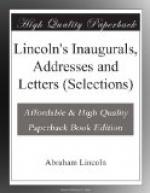Senator Douglas holds, we know, that a man may rightfully be wiser to-day than he was yesterday—that he may rightfully change when he finds himself wrong. But can we, for that reason, run ahead, and infer that he will make any particular change, of which he himself has given no intimation? Can we safely base our action upon any such vague inference? Now, as ever, I wish not to misrepresent Judge Douglas’s position, question his motives, or do aught that can be personally offensive to him. Whenever, if ever, he and we can come together on principle so that our great cause may have assistance from his great ability, I hope to have interposed no adventitious obstacle. But clearly he is not now with us—he does not pretend to be—he does not promise ever to be.
Our cause, then, must be intrusted to, and conducted by, its own undoubted friends—those whose hands are free, whose hearts are in the work, who do care for the result. Two years ago the Republicans of the nation mustered over thirteen hundred thousand strong. We did this under the single impulse of resistance to a common danger, with every external circumstance against us. Of strange, discordant, and even hostile elements, we gathered from the four winds, and formed and fought the battle through, under the constant hot fire of a disciplined, proud, and pampered enemy. Did we brave all then to falter now?—now, when that same enemy is wavering, dissevered, and belligerent? The result is not doubtful. We shall not fail—if we stand firm, we shall not fail. Wise counsels may accelerate or mistakes delay it, but, sooner or later, the victory is sure to come.
SECOND JOINT DEBATE AT FREEPORT, AUGUST 27, 1858
Ladies and Gentlemen; On Saturday last, Judge Douglas and myself first met in public discussion. He spoke one hour, I an hour and a half, and he replied for half an hour. The order is now reversed. I am to speak an hour, he an hour and a half, and then I am to reply for half an hour. I propose to devote myself during the first hour to the scope of what was brought within the range of his half-hour speech at Ottawa. Of course, there was brought within the scope of that half-hour’s speech something of his own opening speech. In the course of that opening argument Judge Douglas proposed to me seven distinct interrogatories. In my speech of an hour and a half, I attended to some other parts of his speech, and incidentally, as I thought, answered one of the interrogatories then. I then distinctly intimated to him that I would answer the rest of his interrogatories on condition only that he should agree to answer as many for me. He made no intimation at the time of the proposition, nor did he in his reply allude at all to that suggestion of mine. I do him no injustice in saying that he occupied at least half of his reply in dealing with me as though I had refused to answer his interrogatories. I now propose that I will answer any of the interrogatories, upon condition that he will answer questions from me not exceeding the same number. I give him an opportunity to respond. The Judge remains silent. I now say that I will answer his interrogatories, whether he answers mine or not; and that after I have done so, I shall propound mine to him.




